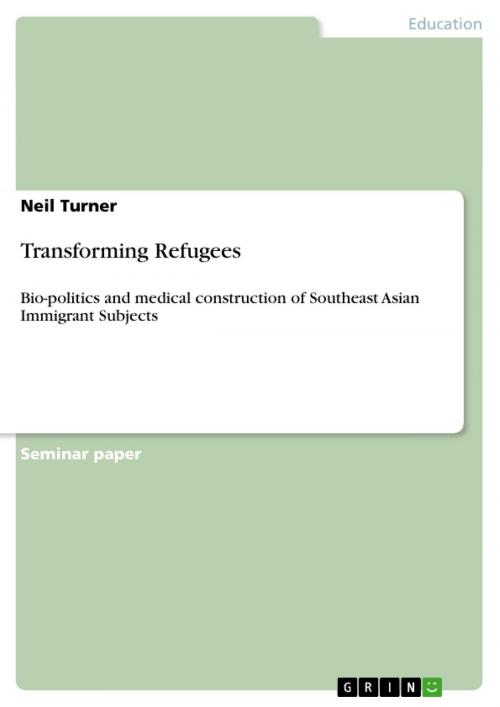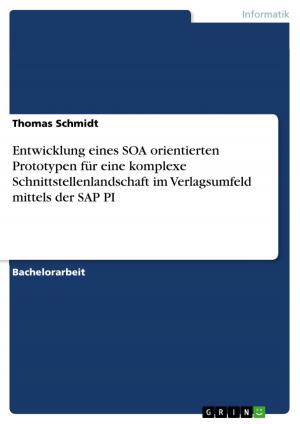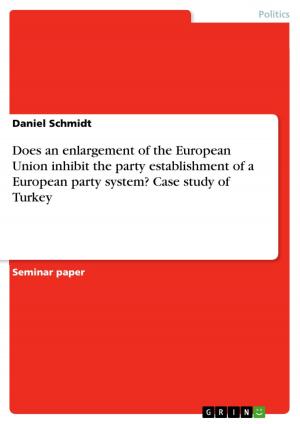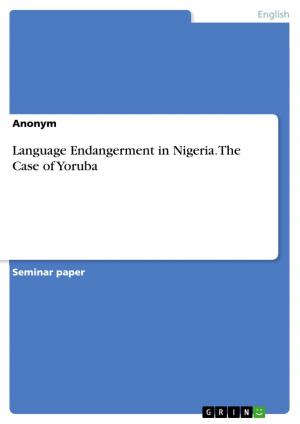Transforming Refugees
Bio-politics and medical construction of Southeast Asian Immigrant Subjects
Nonfiction, Reference & Language, Education & Teaching| Author: | Neil Turner | ISBN: | 9783640414666 |
| Publisher: | GRIN Publishing | Publication: | September 1, 2009 |
| Imprint: | GRIN Publishing | Language: | English |
| Author: | Neil Turner |
| ISBN: | 9783640414666 |
| Publisher: | GRIN Publishing |
| Publication: | September 1, 2009 |
| Imprint: | GRIN Publishing |
| Language: | English |
Seminar paper from the year 2005 in the subject Pedagogy - Science, Theory, Anthropology, grade: A, California State University, East Bay (California State University, Los Angeles and Denver Institute of Urban Studies), course: Anthropology, language: English, abstract: The point of this essay is not to argue that biomedicine has become a mechanism for establishing political or cultural identity for refugees entering the U.S. Neither does it claim that modern biomedicine influences define the character and needs of immigrants. Rather, it seeks to establish that each verifies the other and it seeks to present biomedicine as a mediator of physical realities that gives nation-states justification for domination and control of immigrants and refugees. We will first trace the emergence of the 'gaze' in a historical context to its formation as a classificatory concept and mechanism of power relations. Then, we will discuss the central role of cultural citizenship and its impact on the processes of immigration and assimilation.
Neil Turner is an American anthropologist living in Salvador, Bahia, Brazil. He holds a Ph.D. and a M.A. in Anthropology. While in the USA, Dr. Turner worked as a research analyst for the American College of Physicians (1992 - 2002), and he has worked as a computer information technician for the oldest law practice in the United States, Rawle & Henderson (2005 - 2007). As a professor, he has taught at Tufts University, Boston, MA., California State University, Los Angeles, CA and as an adjunct professor at American Pathways University, Denver, CO. Dr. Turner has authored several papers and his work has been published by Grin Publishers, Munich, Germany. Also, his work has appeared in the Italian online journal for anthropology, Antrocom. Currently, he is teaching ESL, TOEFL, developing educational software for the computer and conducting ethnographic research for a book on Brazil.
Seminar paper from the year 2005 in the subject Pedagogy - Science, Theory, Anthropology, grade: A, California State University, East Bay (California State University, Los Angeles and Denver Institute of Urban Studies), course: Anthropology, language: English, abstract: The point of this essay is not to argue that biomedicine has become a mechanism for establishing political or cultural identity for refugees entering the U.S. Neither does it claim that modern biomedicine influences define the character and needs of immigrants. Rather, it seeks to establish that each verifies the other and it seeks to present biomedicine as a mediator of physical realities that gives nation-states justification for domination and control of immigrants and refugees. We will first trace the emergence of the 'gaze' in a historical context to its formation as a classificatory concept and mechanism of power relations. Then, we will discuss the central role of cultural citizenship and its impact on the processes of immigration and assimilation.
Neil Turner is an American anthropologist living in Salvador, Bahia, Brazil. He holds a Ph.D. and a M.A. in Anthropology. While in the USA, Dr. Turner worked as a research analyst for the American College of Physicians (1992 - 2002), and he has worked as a computer information technician for the oldest law practice in the United States, Rawle & Henderson (2005 - 2007). As a professor, he has taught at Tufts University, Boston, MA., California State University, Los Angeles, CA and as an adjunct professor at American Pathways University, Denver, CO. Dr. Turner has authored several papers and his work has been published by Grin Publishers, Munich, Germany. Also, his work has appeared in the Italian online journal for anthropology, Antrocom. Currently, he is teaching ESL, TOEFL, developing educational software for the computer and conducting ethnographic research for a book on Brazil.















